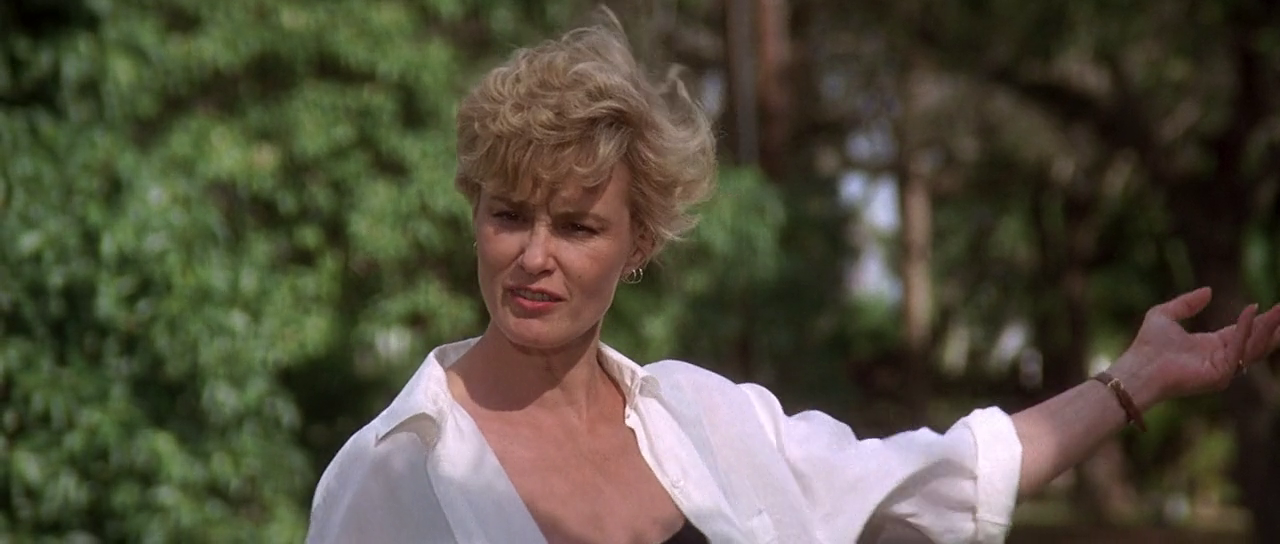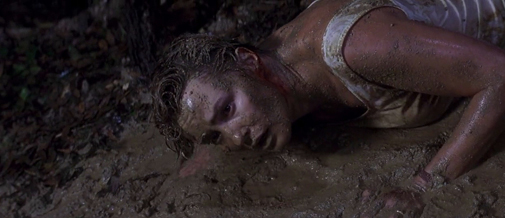by Jason Adams

It was said that the director Ken Russell helped the actor Oliver Reed modulate his performances with a scale ranging from "Moody One" to "Moody Two." And while I am in no way insinuating that the actress Jessica Lange has in any way that sort of limited range -- step off, Lange-anistas, I love her too! -- it wouldn't be out of the realm of possibility to gauge her work on a sliding scale of how much hand fluttering each role involves. And using that system Cape Fear comes out, blissfully, near the top.
Normally if I was feeling inclined to talk about the terrific actressing going on in Martin Scorsese's hot-brained 1991 remake I'd make a bee-line straight for the (rightfully) Oscar-nominated Juliette Lewis, who's the best in show over every single one of her far older and more experienced co-stars...
Max Cady is one of my favorites from De Niro's cast of big career characters but even he seems humbled in Lewis' presence in their showstopping school auditorium scene. Or I might want to talk up Illeana Douglas' devastating work as Nick Nolte's victimized co-worker -- the choices she makes in the scene where Cady attacks her, her drunken, manically delirious laughter bleeding into absolute terror, makes for one of the most disturbing scenes of violence ever put on screen.
But there astride all of this great stuff sits a performance that I personally see as deeply under-valued and under-appreciated -- Jessica Lange's high-strung and left-out-to-dry wife Leigh, whose husband Sam (Nolte) no longer sees her. How one stops seeing Jessica Lange admittedly requires its own leap of faith, but it informs Nolte's character's doltishness well enough -- it's like the old adage about how you can tell the difference between New Yorkers and tourists is that tourists are looking up at the skyscrapers while New Yorkers are looking down for the dogshit; Sam's so busy covering up his footsteps he forgets he's got the Chrysler Building sharing his bed.

Maybe it's just that I miss being able to touch my own face but today my favorite scene of Lange's comes in the very first third of the film, after Max Cady commits the cardinal movie sin of murdering the family dog, and it brings me back to what I was saying about Lange's penchant for acting with her hands -- it's a hell of a hand-waver. Scorsese tasks her with describing the poor pet's poisoning in a single take as the camera closes in on her, and she paints such a vivid portrait of the animal's life slipping away that it's actually hard to watch.
[ANCIENT SPOILER ALERT] Indeed note how she keeps looking to her right the entire time she tells the story -- Lange knows that this is the terrible sort of reverie that nobody wants to, or can, stare straight on at. And the way she flatly drops the story's climax at the peak of Leigh's wobbly hysteria -- "And then he died... he just died." -- actually flashes forward to the film's own ending where, after a bashed-about houseboat battle royale Cady just sinks into the turbulence; he dies, he just dies, and while staring straight at us too. [/SPOILER]
Cape Fear is, in this way, its own treatise on the storytelling of terrible things. Who can stare the bad stuff down; who can watch and hold the eyes of death itself, of innocence petering out. And who also among us flinches. Max Cady sure does, after all, love him his mirrored sunglasses. Illeana Douglas's character bears the scar of her trauma right across her face and yet knows no one will listen to her story of it -- no one believes the worst until it steps into their own houses. Looking into life's monsters can and will forever change us -- all you need are eyes to see, and perhaps hands to wave, wave, wave the tears and the memories down your cheek, leaving smears like tattoos, mascara, muck.
